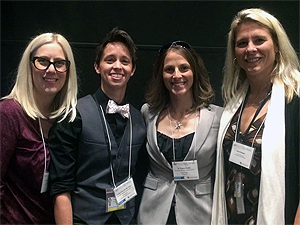Global picture, personal stories in focus at GLBTI Symposium
From left, Cammie Kennedy, Faculty Council GLBTI Committee member; committee co-chairs Lindsay O’Connell and Troyann Gentile; and Faculty Council Chair Laura Borgelt at Friday’s GLBTI Faculty Council Symposium on the CU Anschutz Medical Campus.
The Faculty Council GLBTI (Gay, Lesbian, Bisexual and Transgender Issues) Committee’s third annual symposium brought together about 100 faculty, staff and students from across the system to the CU Anschutz Medical Campus for a half-day discussion focused on health equity at CU.
Speakers, panelists and participants last Friday shared stories both professional (research on health equity among GLBT populations) and personal (experiences of navigating health insurance usage as a member of the transgender community).
CU Regent Stephen Ludwig welcomed attendees with a laugh – “I love the fact that we’re at a health symposium and have doughnuts” – and a reading of the Board of Regents’ anti-discrimination policy, which was revised in 2013 to add protections for diverse expression of political philosophy, as well as gender identity and gender expression.
“Among the number of amazing things our university does, we need to hold up what the values of our community are – or should be,” Ludwig said.
Other CU leaders who attended and/or spoke at the event included Board of Regents Vice Chair Irene Griego; E. Jill Pollock, vice president, Employee and Information Services; Kathleen Bollard, vice president for academic affairs; and Brenda J. Allen, associate vice chancellor for diversity and inclusion at CU Denver, who opened with a Martin Luther King Jr. quote: “Of all the forms of inequality, injustice in health care is the most shocking and inhumane.”
In her keynote address, Angela Sauaia, M.D., Ph.D., highlighted health inequities among the GLBT population, beginning with how laws treat the group differently, e.g. marriage and civil unions. Health challenges facing the population include chronic stress that sexual and gender minorities might experience because of stigmatization in society.
Sauaia is an associate professor of public health, medicine and surgery at CU Denver. She earned her medical degree from the University of Sao Paulo, Brazil, and her doctorate in analytic health services from CU Denver. This year she published a book, “The Quest for Health Equity.”
Sauaia said health care professionals have little or no training in specific GLBT health issues, and that a lack of research data puts the population at a greater disadvantage: The National Healthcare Disparities Report didn’t address health disparities in GLBT groups until 2011.
She urged researchers to work toward solving such inequities by collecting reliable, accurate data, producing rigorous scientific research and implementing evidence-based practices.
“I call on health equity agents to be ready, be strong, be martyrs,” she said.
During a panel discussion on health care matters, Christine Gilroy, M.D., MSPH, FACP, of the CU School of Medicine and Colorado HealthOP, noted that some health insurance providers lag in acknowledging the necessity, for some, of gender-change surgery. Even the American Medical Association, she said, has determined that such operations are neither experimental nor cosmetic.
Another panel member, Morgan Seamont, assistant director of the GLBTQ Resource Center at CU-Boulder, said he was born female and transitioned while attending CU-Boulder as a graduate student. Though he became a staff member in July and continues as a student, he said he chose to keep student insurance because it covers gender assignment surgeries, while employee insurance does not.
Gena Trujillo, assistant vice president for the CU Health Plan administration, said the university is working on providing transgender surgery as a coverage benefit, possibly as soon as next July. One challenge in working with health care providers, she said, is that none provide transgender surgeries within Colorado.
“I want to emphasize our desire to work toward a better way of providing health care for all communities, including GLBT,” Trujillo said.
The symposium benefited from overwhelming response to advance fundraising, said GLBTI Committee co-chairs Troyann Gentile and Lindsay O’Connell, with more than enough funding – $12,000 – collected. The overage was put toward grants awarded to two student groups – one at CU-Boulder, the other at CU Anschutz – to be used for raising awareness for GLBT communities on their campuses.


